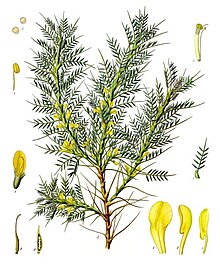Astragalus brachycalyx, the Persian manna or manna, whose name is derived from the Greek ‘brachy’ meaning short, and ‘calyx’ referring to the sepal of the flower, is a species of legume commonly found on rocky mountain slopes in western Asia, from western Iran and northern Iraq to Turkey, and is commonly used as a source of gum tragacanth.[1][2][3]
| Persian manna | |
|---|---|

| |
| Scientific classification | |
| Kingdom: | Plantae |
| Clade: | Tracheophytes |
| Clade: | Angiosperms |
| Clade: | Eudicots |
| Clade: | Rosids |
| Order: | Fabales |
| Family: | Fabaceae |
| Subfamily: | Faboideae |
| Genus: | Astragalus |
| Species: | A. brachycalyx
|
| Binomial name | |
| Astragalus brachycalyx | |
| Synonyms | |
|
Astragalus adscendens Boiss. & Hausskn. | |
References
edit- ^ "Astragalus adscendens Persian Manna PFAF Plant Database".
- ^ "Astragalus brachycalyx Fisch". Germplasm Resources Information Network. Agricultural Research Service, United States Department of Agriculture. Retrieved 24 December 2010.
- ^ Aslanipour, Behnaz; Gülcemal, Derya; Nalbantsoy, Ayşe; Yusufoglu, Hasan; Bedir, Erdal (September 2017). "Cycloartane-type glycosides from Astragalus brachycalyx FISCHER and their effects on cytokine release and hemolysis". Phytochemistry Letters. 21: 66–73. Bibcode:2017PChL...21...66A. doi:10.1016/j.phytol.2017.05.028. hdl:11147/6631.